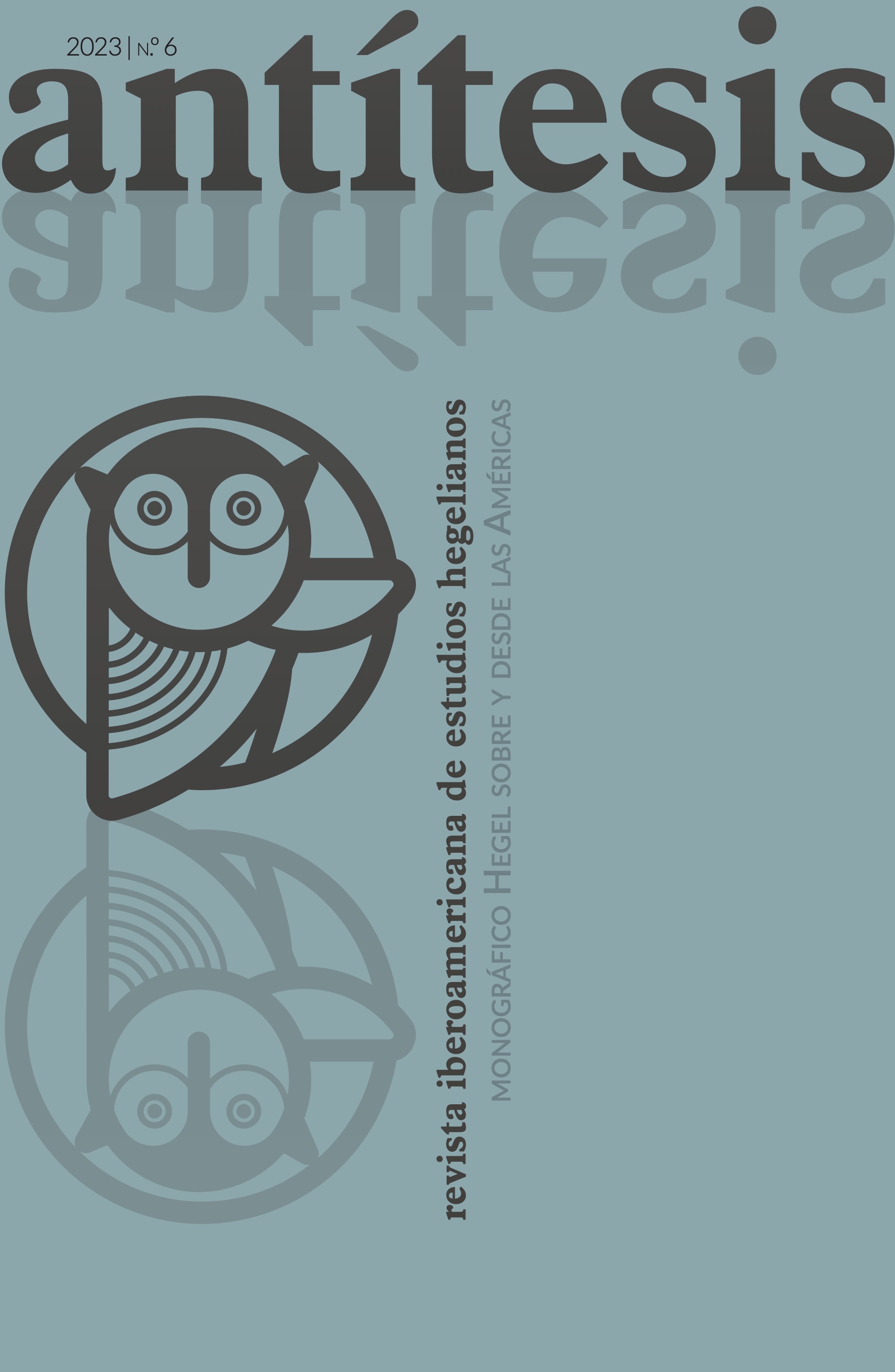Palabras clave:
Hegel, Dialéctica, Lógica no clásica, América LatinaDerechos de autor 2024 Arturo Romero

Esta obra está bajo una licencia internacional Creative Commons Atribución 4.0.
Resumen
El presente texto comienza subrayando el privilegio que Hegel otorga a ciertas regiones geográficas en el contexto de la historia universal en detrimento de otras. Se señala particularmente cómo los pueblos primeros del Oriente pierden actualidad cuando el espíritu de la historia se traslada a otro pueblo nuevo, apropiándose de ese pasado y volviéndolo su patrimonio. Los pueblos primeros son considerados la infancia de la humanidad y, si no se extinguen, continúan una existencia de fósiles vivientes. Igualmente, los pueblos que no constituyen el pasado de Europa carecen de existencia histórica hasta ser descubiertos por ésta. Así, tanto los pueblos que salen de la historia, como los que ingresan a ella se miden de acuerdo con un único presente, que constituye la punta de lanza de la historia y que se finca en la potencia mundial del momento. Con miras a conservar la potencia crítica del pensamiento hegeliano en muchos otros respecto, pero enmendando sus obvias limitaciones en el juicio de otros pueblos, naciones y grupos humanos, ofrecemos elementos para ampliar el espacio lógico que ofrece su dialéctica. Proponemos su expansión hacia una “dialéctica ramificada”. Ella exigiría pensar una historia que tiene diferentes “hilos históricos” simultáneos que se atan y se desatan tanto en una secuencia temporal, como a partir de encuentros puntuales en el espacio geográfico del mundo. Existe también pluralizar el presente en diferentes focos. El reto lo constituye el poder mantener una dinámica dialéctica local, pero no global. Para ello nos servimos del pensamiento del lógico Gotthard Günther.
Descargas
Citas
Arndt, A. (2004). Hegels Transformation der Transzendentalen Dialektik. En: Álvarez Gómez, A. y Paredes Martín, M. del C. La controversia de Hegel con Kant. Salamanca: Ediciones Universidad de Salamanca.
Buck-Morss, S. (2009). Hegel, Haiti, and universal history. Pittsburgh: University of Pittsburgh Press.
Comaroff, J. y Comaroff, J. L. (2013). Theory from the South: Or, How Euro-America is Evolving Toward Africa. Paradigm Publishers.
Derrida, J. (1997). El monolingüismo del otro. Buenos Aires: Manatial.
Echeverría, B. (1988). La modernidad de lo barroco. México: Era.
Fichte, J.G. (1997). Grundlage der gesammten Wissenschaftslehre. Hamburgo: Felix Meiner.
Fichte, J.G. (1991). Grundlage des Naturrechts nach Principien der Wissenschaftslehre. Hamburgo: Felix Meiner.
Günter, G. (1979). Beiträge zur Grundlegung einer operationsfähigen Dialektik: Band 2. Wirklichkeit als Poly-Kontexturalität. Hamburgo: Felix Meiner.
Hegel, G.W.F. (1966). Fenomenología del espíritu. Trad. Wenceslao Roces. México: FCE.
Hegel, G.W.F. (1976). Ciencia de la lógica. Trad. Augusta y Rodolfo Mondolfo. 4ª. Edición. Argentina: Solar/Hachette.
Hegel, G.W.F. (1978b). Escritos de juventud. Edición, introducción y notas de José M. Ripalda. México-Madrid-Buenos Aires: FCE.
Hegel, G.W.F. (1986a). Werke, Bd. 19. Vorlesungen über die Geschichte der Philosophie I. Fráncfort del Meno: Suhrkamp.
Hegel, G.W.F. (1986b). Werke, Bd. 20. Vorlesungen über die Geschichte der Philosophie III. Fráncfort del Meno: Suhrkamp.
Hegel, G.W.F. (1986c). Wissenchaft der Logik. 1. Band. Die Objektive Logik. Hamburgo: Felix Meiner.
Hegel, G.W.F. (1989). Werke, Bd. 12. Vorlesungen über die Philosophie der Geschichte. Fráncfort del Meno: Suhrkamp.
Hegel, G.W.F. (1999). Principios de la filosofía del derecho o derecho natural y ciencia política. Traducción y prólogo de Juan Luis Vermal. Barcelona: Edhasa.
Hegel, G.W.F. (2005). Enciclopedia de las ciencias filosóficas en compendio. Edición, traducción y notas de Ramón Valls Plana. Madrid: Alianza.
Hegel, G.W.F. (2011). Ciencia de la lógica. Introducción, traducción y notas: Félix Duque. Madrid: Abada.
Kaehr, R. (2017). “Deconstruction and diamond strategies”. En: Paul, J. Vordenker, Verano 2017. En línea: https://www.vordenker.de/rk/rk_Deconstruction-and-Diamond-Strategies_1998.pdf Consultado en septiembre de 2023.
Kant, I. (2013). ¿Qué es ilustración? Y otros escritos de ética, política y filosofía de la historia. Edición de Roberto Aramayo. Madrid: Alianza.
Kant, I. (2007). Crítica de la razón pura. Trad. Mario Caimi. Buenos Aires: Losada.
Priest, G. (2002). Beyond the limits of thought. Oxford y Nueva York: Clarendon Press, Oxford University Press.
